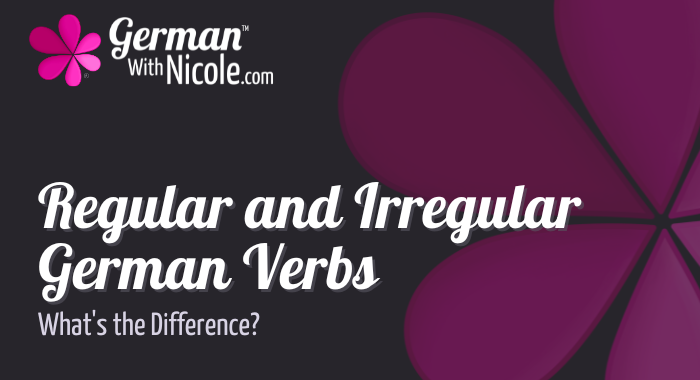Regular and Irregular German Verbs: What's the Difference?

Almost all of the people who sign up for private German lessons have already run into German verbs and their conjugations.
When we get to the Perfekt (the present perfect or spoken past tense), it's always interesting to hear what they think of it so far.
Here are a few of the top questions people have asked me about learning the Perfekt:
-
Are these regular or irregular verbs?
-
What's the difference between them?
-
What's the pattern for these verbs? And for these verbs? And for these? Why are these verbs all different?!
-
Do you have a list of ALL of the verbs? I want to learn them all this weekend.
There are various names for verb categories, too: regular, irregular, strong, weak, mixed verbs.
If you'd like an easier, better way of understanding regular and irregular verbs, you're in the right place.
Here's a video for you with a very GermanWithNicole-style explanation of the difference between them and the best-kept secret to learning them.
Click the image below to play the video. Klicken Sie hier:
Categories
- A1 (69)
- A2 (54)
- B1 (46)
- B2 (23)
- C1 (22)
- Deutsch lernen (78)
- Einkaufen (15)
- Essen (12)
- Grammatik (23)
- Hören (14)
- Landeskunde und Kultur (49)
- Lesen (11)
- Musik (5)
- Nachrichten (4)
- Podcast (61)
- Pronunciation (3)
- Schreiben (3)
- Schwäbisch (4)
- Spiele und Spaß (Games and Fun) (12)
- Sprechen (13)
- Vokabeln (39)
- Video (11)
3 comments
Very helpful video. I am like the twisty turns lines getting caught up in the grammar as opposed to just using the verbs.
Not any more,@Michele Rudzewick ! All your lines are straightening out. :-D
One of my clients tried to note whether verbs were regular or irregular and he said this about what that was like for him:
Leave a comment